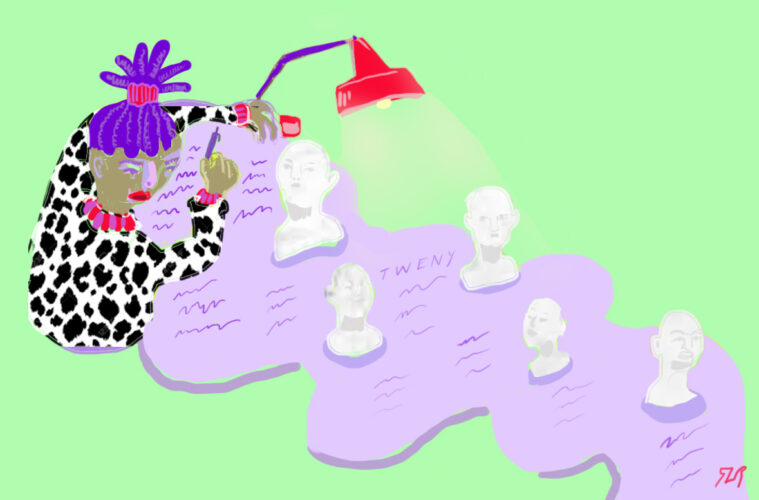This piece, written by Edith Knight Magak, was originally published on Non.Plus Lit.
This book would not have been possible without the help and support of several people. And I would like to thank all of them.
Special glowing thanks to my super-agent MGO whose priceless advice on my hair made this book see the light of day. Her constant reminder of “Darling you know I love your hair with all its Tarzan kinky coils, but when coming for meetings could you please straighten it, heat it or tame it, or whatever. These people are sensitive, they will think all this hair is some sort of political statement”. Thank you so much for letting me know that my hair was a major determinant on whether I became a published author or not.
My biggest thanks to BB for his continuous reminders that unless my work conformed to typical Black literature, it was going to be a hard sell. His patience and guidance as he helped me transform this book to include themes such as Poverty porn, struggle narratives, and Queer experience. I cannot forget his keen insight and insistence of the need to include white men with a messiah role. That was a breath of fresh air to this book. “Alternatively, if it can maybe read like ‘Behold the Dreamers’ or ‘Americanah’, not all the way, but you get the drift, right?” Yes BB, I got the drift.
I am so lucky to be represented by such people.
My sincere gratitude also goes to Missy Super Duppy who would have almost been my agent. Only that she already had 2 Black writers and had filled that quota for the year. I thank her for opting to consider me for next year. I am particularly grateful for it is her who pointed me in the right direction.
After 4 years of pitching to agents and getting ‘sorry, got nothing back’ it was her insight that enabled me to white-wash my story and exorcise all the blackness it oozed. “Sweetie, the big boys don’t accept unagented submissions, and agents don’t like Black writings. They worry about quality, and they don’t like work they can’t connect with. They also don’t want to saturate the market with too many Black narratives. Package it as a White story that is accidentally Black, then you will have a chance” Thank you, Missy, it was this wonderful advice that made MGO and BB look at my work and represent me.
A writer needs expert counsel. A thousand thanks to EW, for all the late nights, when he taught me to speak through my nose and not my mouth.
Because of this, I was able to impress the publishing team and I stopped saying twenTY and could confidently say tweny. Their strange mocking looks diminished soon after, all thanks to you.
You see this was very important, I had to speak like I was born and bred inside Buckingham palace even though English is my third language. “And as much as possible keep on dropping that you studied English literature in your undergrad and also have an MFA, don’t let them forget that” Thank you for your love and support, EW.
My greatest debt of gratitude is especially owed to DMF of Publishing House for all the work he put in this novel. His careful scrutiny for quality, and then cutting out all the unnecessary things to make my book extra-conform to the Black literature range was remarkable. This book is so much better after your hard work of removing all the ‘difficult topics like race’ and ‘endless African descriptions’ I am eternally grateful. “We don’t want to make the readers too uncomfortable. You don’t want to lose them, right? The last thing our readers should be is confused” Thank you DMF, because of you, my dear reader has not felt uncomfortable, lost or confused.
I am so thankful to all my friends, fellow writers and beta readers for their abundant enthusiasm. For pointing out to me that most of my references were African writers like Achebe, Ngugi and Emecheta, and for their passionate advice to instead use Hemingway, Faulkner, Foster-Wallace and Munro as references.
A huge thank you for making this Black woman look sophistically read.
To my publicist CL. For polishing my bio and media profile and editing out all the African magazines where my earlier works had appeared. ‘I have never heard of them’ was her only comment. Many thanks for disregarding me when I told you that those were renowned magazines in the African Lit scene. I am so grateful for her expert suggestions. “Well our readers may not know them and anyway, being published in American magazines shows that your works are of higher quality. And I see you’ve been published in QC magazine; the editor is a good friend of mine. Being published there shows that you have good taste.” Thank you for the bleached publicity.
To my dear friend Bellie for all her encouragement. I couldn’t have done this without you. For her wisdom and enabling me to remain cool “Don’t appear aggressive. Don’t look like you will be difficult to work with”. Thank you for listening to my cries and ramblings at the unfairness of it all. She continuously grounded me with “Girl, don’t you know, there is only room for one Black woman to shine at any place at any time. Two’s a crowd babe, your time will come”. Thank you, sweetie, for the reality.
And to you my reader.
Fuck you all. Sorry, I meant,
Thank you all.
Written by Edith Knight Magak.
Edith is a Kenyan writer, editor and Creative Nonfiction Interviewer at Africa in Dialogue. Prior publication credits include Brittle Paper, Critical Read, WSA, Urban Ivy, Flash Fiction Magazine, Jalada, among others. She is a member of the African Writers Development Trust.

